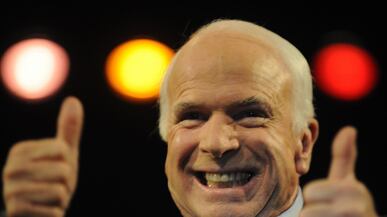“Vegas, baby!” Those two words from the movie Swingers have come to represent American impulsiveness in all its glory. We are an innate culture of gamblers and the city itself has symbolized that since its creation. The American dream of rags to riches feels attainable the minute your airplane lands on the Strip. I love Las Vegas in a way separate from my love of any other American city. For me growing up, it was a town of many firsts and where I enjoy a level of anonymity. It is a city that encourages indulgence, adult recreation and gambling, where it’s a mandate to check your moral code at the door—that’s why what happens in Vegas, stays in Vegas. Trust me: for a young, rebellious senator’s daughter this isn’t something that happens very often.

But the recession hit Vegas harder than almost any other city. As this week’s Newsweek reports, the properties on the Strip posted a $6 billion loss in two years and unemployment is at a Libya-like 26 percent. Even the president told Americans to abandon Las Vegas. "When times are tough, you tighten your belts," Obama said in 2010. "You don't go buying a boat when you can barely pay your mortgage. You don't blow a bunch of cash on Vegas when you're trying to save for college." The statement not only infuriated lawmakers, and thousands of locals who relied on tourism for their jobs, but it seemed to mark a turning point during our difficult economic times. Our commander in chief, like a stern parent, told us that we were no longer allowed to have fun.
My father loves Las Vegas, and he loves to play craps. Growing up, I’d find old Caesars Palace chips in his pocket that he forgot to cash out. During the election, I used to love going to Nevada to campaign because the casinos were never far (I always played red at the roulette wheel, duh). But my dad received some criticism for not only gambling, but his choice of game as well. President Obama is a poker player, which the media used as part of the narrative that he was more calculated and careful as a politician. Craps was just too risky, and—in a far stretch—this was meant as a way to measure how my father would govern.
At one point, a blog even picked up a picture of my father at a craps table that had been taken by someone on a blurry camera phone. It sent the D.C. media world in a tizzy, and Vegas lost another one of its tourists along the way. My father doesn’t gamble anymore and he doesn’t go to Vegas because it’s apparently unseemly for a sitting senator to be found in a casino.
My father loves Las Vegas, and he loves to play craps.
But the last thing I expected was that even I would come under fire for a visit to the Strip. Last September, my boyfriend broke up with me over a five-line email. I had a speaking engagement at Juniata College, but that would have to wait. I cancelled the speech and fled to Vegas for a girl’s weekend. I was at the blackjack table at the Bellagio when one of my girlfriends told me the Internet was going crazy. What now? “Meghan McCain Blows Off Book Tour to Party in Vegas,” declared Gawker. The Chronicle of Higher Education weighed in with, “What happens in Vegas stays in Vegas—unless you’re arrogant enough to post it to your Twitter feed.” It wasn’t so much that I had cancelled a speaking engagement. It was that I was in Vegas instead. I later saw a video by the infamous Web series The Young Turks where one of the hosts came to my defense and said, “Sometimes you just need to go to Vegas.”
We all do. We need to take back the Strip, the casinos, the night clubs, the all-you-can-eat buffets, the shopping, the restaurants, and especially the Stratosphere. Let’s all jump on a plane and head to Vegas, baby. This is my plea to the American public, because the next time I go, I’d like to bring my dad with me.
Meghan McCain is a columnist for The Daily Beast. Originally from Phoenix, she graduated from Columbia University in 2007. She is a New York Times bestselling children's author, previously wrote for Newsweek, and created the Web site mccainblogette.com. Her most recent book, Dirty Sexy Politics, was published in August.






